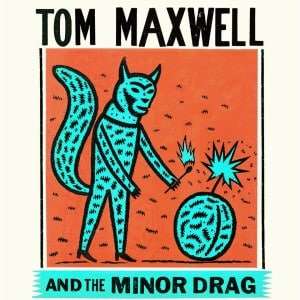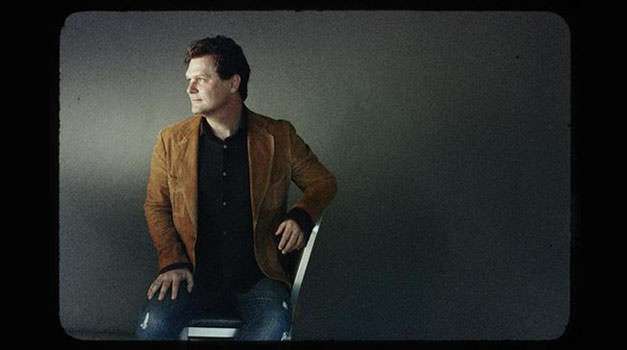Hell: My Life in the Squirrel Nut Zippers by Tom Maxwell
Tom Maxwell rose to fame writing and playing for the interestingly named band, Squirrel Nut Zippers. With his help, the band’s hit “Hell” rocketed them to new heights, bringing their retro-swing sound to big stages in venues such as Los Angeles and Europe.
Fast forward almost 20 years, and Maxwell is still writing, but this time it’s not just song lyrics. He is a recurring contributor for the news site Al Jazeera America and has appeared on popular sites like Salon and Oxford America. We talked with the new author about writing his first memoir, Hell: My Life in the Squirrel Nut Zippers and got inside the mind of the lively musician who says writing this book was a freeing experience.
 BookTrib: So, you also have a new album that was just released. Did you write the album and the book at the same time?
BookTrib: So, you also have a new album that was just released. Did you write the album and the book at the same time?
Tom Maxwell: The album and the book were released at the same time, and thank you for not saying “dropped.” Generally speaking, they were written at the same time. I think there’s kind of a happy symmetry to it because the record is where I am now and the book is obviously how I got here. It is also the same image for both covers. You know, that dude in a squirrel suit who is apparently blowing himself up with a walnut bomb.
BT: So why did you decide to write a memoir? What was it about your experience in the Squirrel Nut Zippers that made you want to share those stories?
TM: Well, they’re good stories, and I had been sharing them on my porch for years. People would say, ‘Tell the one about when Kenny made the taxi guy drag race!’ You know, crazy stuff like that. Then, at some point it goes from being memories to wondering if it was all a dream. Did that really happen? Am I remembering that correctly? So I thought it’s good to get the stories down because I will forget or it will mutate into something. I think it’s all entertaining and possibly instructive.
BT: How did you go about writing those stories?
TM: I just wrote the son of a bitch and I cranked it out quickly. I did it like I do everything, which is the hard way. Emotionally I put myself back in that time. I chose to face that turbulence that I had put under the bed and it was really intense. I think it was therapeutic.
BT: Was writing the book similar to writing music?
TM: I don’t know if that is how I write songs; writing songs isn’t quite so sustained.
BT: Did you read any memoirs before writing yours? Were you worried about writing the standard musician memoir?
TM: No, I pointedly didn’t. I don’t know what I was reading at the time, but it was probably about as far away from memoirs as you could get. I did read some excerpts but my big struggle was not how to frame the narrative so much as whether or not I had any business doing it all. It’s like, do I have the right to turn my friends into characters, and then will narrative truth somehow displace historical truth? You know, I’m a Virgo! That’s the kind of crap I put my brain through. But it was important to get to that point where I thought if I do this, I need to do it right and I need to do it justice.
BT: How did it feel writing about the difficult moments in your career with Squirrel Nut Zippers?[giveaway giveaway_id=1684 side=”right”]
We’re giving away a copy of the book and the new CD!
TM: It hurt. There’s a big part of me that did not want to go back and revisit some of that stuff. We all have times in our lives when really awful things happen that shape us, but you don’t really want to go back there and feel that way. You know the best way to subscribe to the illusion of progress is to feel like you are better now or that you can put it all behind you. So, when I wrote about when we were in that room in Boston where Ken sees Stacy shoot up, it was horrible. That was really bad. It was really bad because it killed him. But, what can I say? It’s my job to put that across and do it in a way that is fair and not too indulgent.
BT: I can relate to that.
TM: Can’t we all? If I am doing my job right, [this book] will resonate with people. It seems like the more specific one gets, the more universal it can become. I don’t even know what else to say about that. It is just fascinating.
BT: So let’s pick it up. In the book you mentioned many of the musicians that helped shape your sound, like Fats Waller and Cab Calloway. How important was it for you to mention the musicians that helped you find your voice?
TM: It was just as important for me to talk about them in the book as it was to talk about them when I would do interviews. When were being interviewed back in the day people would ask, ‘What are you listening to now?’ and they would want me to say, “Cherry Poppin Daddies,” but I wasn’t listening to them. Instead I would say, “This Fats Waller stuff is killer,” or mention someone random. I wanted people to hear that especially if they expressed in an interest in the Squirrel Nut Zippers’ sound. For the memoir it was important because when I really like a band I like to know everything about them before they came to prominence. You know, get a feel for what they listened to. So I was hoping some people could spark off and say, “Well I like Fats Waller, so I should really listen to Cab Calloway.” Also, no artist springs fully formed. There would have been no point in writing the book without showing where we came from.
BT: You also provide the back-stories for many of the Squirrel Nut Zippers hits. Was that also important for you?
TM: It was because when you do [write music] you can’t say what the song is really about and I like it when I hear what songs are about from the artist. When I was a kid I was a big fan of Small Faces and their big hit “Itchycoo Park” was completely listed from a hymn called, “God Be in My Head,” and I’m like, this is so cool because it was not what I would have thought of. The song is about getting high as a kite! I would have never known that and now that makes it a much better experience.
BT: Would you write another book?
TM: Oh, hell yes! I don’t think there’s going to be a Part 2 of the Squirrel Nut Zippers story, but I’ve been writing. That’s what I was born to do, that’s what I do well and that’s what I am going to keep doing. Sometimes it’s with a song or written word, but I just want to communicate. It’s all just communicating.




